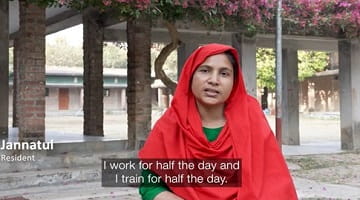2024/25 entry Applications also open for 2025/26
MA Teaching Learners with Visual Impairment
About this course
This MA is a 60 credit top-up for graduates of the PgDip Teaching Learners with a Visual Impairment QTVI who want to further their professional and academic development.
- Designed to support students who have completed the PgDip Mandatory Qualification for Teaching Learners with a Visual Impairment to undertake a research project in an area of your choice
- Person-centred inclusive thinking and teaching approaches designed to engage you as a self-directed learner and reflective practitioner
- Lead by experts in the field of education who bring both extensive academic and professional expertise
- Benefit from the flexibility of a programme that enables you to fit study around your work commitments
LJMU is one of only three providers to offer an MA in Teaching Learners with a Visual Impairment.
Professional body recognition
In partnership with St Vincent's, LJMU is accredited to deliver this Mandatory Qualification for Teaching Learners with a Visual Impairment (MQTVI).
You can find the register of providers accredited to deliver Specialist Teacher training on the Government website.
Fees and funding
There are many ways to fund postgraduate study for home and international students
Fees
The fees quoted at the top of this page cover registration, tuition, supervision, assessment and examinations as well as:
- library membership with access to printed, multimedia and digital resources
- access to programme-appropriate software
- library and student IT support
- free on-campus wifi via eduroam
Additional costs
Although not all of the following are compulsory/relevant, you should keep in mind the costs of:
- accommodation and living expenditure
- books (should you wish to have your own copies)
- printing, photocopying and stationery
- PC/laptop (should you prefer to purchase your own for independent study and online learning activities)
- mobile phone/tablet (to access online services)
- field trips (travel and activity costs)
- placements (travel expenses and living costs)
- student visas (international students only)
- study abroad opportunities (travel costs, accommodation, visas and immunisations)
- academic conferences (travel costs)
- professional-body membership
- graduation (gown hire etc)
Funding
There are many ways to fund postgraduate study for home and international students. From loans to International Scholarships and subject-specific funding, you’ll find all of the information you need on our specialist postgraduate funding pages.
Please be aware that the UK’s departure from the EU may affect your tuition fees. Learn more about your fee status and which tuition fees are relevant to you.
Employability
Further your career prospects
LJMU has an excellent employability record with 96% (HESA 2018) of our postgraduates in work or further study six months after graduation. Our applied learning techniques and strong industry connections ensure our students are fully prepared for the workplace on graduation and understand how to apply their knowledge in a real world context.
The overall aim of the programme is to meet the professional and research learning needs of those working within the education and service sector for learners with a visual impairment.
After completing the MA, you will be able to play a significant role in the application of knowledge in the field of education practice in schools, colleges and other educational settings.
The student experience
Discover life as a postgraduate student at LJMU.
News and views
Browse through the latest stories and updates from the University and beyond
Course modules
Discover the building blocks of your programme
This course is currently undergoing its scheduled programme review, which may impact the advertised modules. Programme review is a standard part of the University’s approach to quality assurance and enhancement, enabling us to ensure that our courses remain up to date and maintain their high standard and relevancy.
Once the review is completed, this course website page will be updated to reflect any approved changes to the advertised course. These approved changes will also be communicated to those who apply for the course to ensure they wish to proceed with their application.
Your programme is made up of a number of core modules which are part of the course framework. Some programmes also have optional modules that can be selected to enhance your learning in certain areas and many feature a dissertation, extended report or research project to demonstrate your advanced learning.
The MA top-up comprises one 60 credit Level 7 module.
Core modules
Dissertation
60 credits
The Dissertation is the 'top-up' module to give you the required number of total credits (180), when combined with the 120 credits of your MQVI PgDip, to attain the Masters degree. It's only applicable to the MA programme.
This module provides you with the opportunity to investigate a topic of your choice relating to teaching learners with visual impairments.
You will be expected to engage with seminars, online materials and regular meetings with your supervisor (including regular online contact) to ensure progression of the project and to effectively integrate formative feedback and feedforward.
You will be supported to continue fostering a deep approach to learning; enhancing practice which is informed by critical reflection, scholarship and research.
Teaching
An insight into teaching on your course
Study hours
There will be three weekends at LJMU during the year (24 delivered hours).
Students are also expected to carry out 576 hours of independent study.
Teaching methods
A blended learning model forms the basis of study for this programme. It uses a range of teaching and learning methods, including both face-to-face teaching, technology enhanced learning and individualised learning opportunities.
You will benefit from:
- seminars
- individual tutorials
- online materials
- case studies
- independent learning.
The programme involves a significant amount of independent learning and requires you to be motivated and self-directed in your study, as well as professional development.
Independent learning will be supported through a range of online learning resources (including but not limited to core readings, formative and structured tasks, audio/video links) and a clear support framework will help you to manage your academic study.
In addition, you will be supported through one-to-one tutorials and be able to gain feedback from an assigned supervisor at key stages of the research process - from initial design to write-up of findings.
There will also be opportunity for group work and discussions during seminar activities enabling you to work together, learn from each other and develop an intimate research community dedicated to exploring key topics and debates relating to teaching learners with visual impairment.
Your research project can be conducted in your own classroom, school or other educational setting. However, alternative suitable settings can be discussed with your supervisor.
Assessment
How learning is monitored on your programme
To cater for the wide-ranging content of our courses and the varied learning preferences of our students, we offer a range of assessment methods on each programme.
The assessments have been designed to ensure they meet the appropriate academic requirements of Level 7 while also being deeply rooted in your professional practice.
They are based on application of theory and research practice in professional contexts and require you to reflect critically on practice.
Course tutors
Our staff are committed to the highest standards of teaching and learning
Matt McLain
LJMU Link Tutor
Clara has worked as a Lecturer in Education and Early Childhood Studies at LJMU since 2011. Clara teaches across a range of modules relating to disability and inclusion on the Education Studies suite of programmes. She has been programme leader/link tutor for the PGDIP Teaching Learners with a Visual Impairment since September 2018. She has also been the School of Education Disability Coordinator (DISCO) for two years. Her research interests include the representation of disabled people in the media and supporting SEND and EAL learners.
The most rewarding aspect of my role as programme leader is seeing students develop both personally, professionally and academically. In addition, this programme develops a supportive community of leading QTVI professionals who are actively informing current practice of teaching learners with VI.
Entry requirements
You will need:
Qualification requirements
Undergraduate degree
- An Honours degree (or its equivalent) in any subject
International requirements
-
IELTS
Applicants whose graduate study or relevant experience was undertaken in languages other than English, will need to demonstrate English language proficiency to the level of an IELTS score of at least 6.5 (minimum of 5.5 in each component).
Further information
-
Extra Requirements
As well as an Honours degree, the normal entry requirements are:
- Qualified Teacher Status
- PgDip with Mandatory Qualification for Teaching Learners with a Visual Impairment
- Current employment as an educational practitioner working with visually impaired learners
-
RPL
RPEL applications are accepted from applicants holding the appropriate mandatory qualification, PGDip QTVI. In these cases, 120 credits will be awarded as part of the entry onto this MA programme where the following criteria has been met:
- Demonstrate a systematic understanding of the existing knowledge base and current issues relating to teaching, learning and support for visually impaired learners
- Demonstrate a comprehensive and critical understanding of research methodologies and debates relevant to the study of teaching, learning and support frameworks for visually impaired learners
- Synthesise current and original concepts for the creation and interpretation of knowledge in relation to teaching learning and support for visually impaired learners
- Demonstrate a critical understanding of the role of the educational professional within a wider social and professional setting
- Apply relevant knowledge of teaching and learning for visually impaired learners to a range of complex educational situations
- Critically assess current practice and issues in education relating to teaching and learning for visually impaired learners, informed by theory and leading edge research and practice in the field
- Demonstrate creativity in the application of knowledge and development of a critical and informed perspective on how techniques of research and enquiry are used to interpret knowledge and practice in Education
- Acquire and synthesise data and concepts from a range of sources and conceptual frameworks and apply this in reflecting on and evaluating educational practice in relation to teaching and supporting learners with a visual impairment
- Demonstrate competence in the application of appropriate learning to educational practice relating to teaching and supporting visually impaired learners
- Manage complex situations relevant to professional practice
- Apply the capacity for original thinking and critical analysis and reflection on participants' professional practice
- Engage in a process of critical evaluation of own value systems and conceptual assumptions
- Communicate effectively to a wide range of individuals by a variety of means
- Manage time and work to deadlines
- Deal with complex issues both systematically and creatively
- Be pro-active in recognising the need for change and have the ability to manage change
- Be adaptable and show originality, insight and reflection in dealing with professional issues
- Demonstrate self-direction and autonomy in dealing with professional issues
- Acquire effective learning strategies for the purpose of career long continuing professional development
Application and selection
Securing your place at LJMU
To apply for this programme, you are required to complete an LJMU online application form. You will need to provide details of previous qualifications and a personal statement outlining why you wish to study this programme.
You can apply for this programme using our online application form.
You should complete the form thoroughly and provide a detailed personal statement which reflects your suitability and aptitude for the MA Teaching Learners with a Visual Impairment.
The University reserves the right to withdraw or make alterations to a course and facilities if necessary; this may be because such changes are deemed to be beneficial to students, are minor in nature and unlikely to impact negatively upon students or become necessary due to circumstances beyond the control of the University. Where this does happen, the University operates a policy of consultation, advice and support to all enrolled students affected by the proposed change to their course or module.










